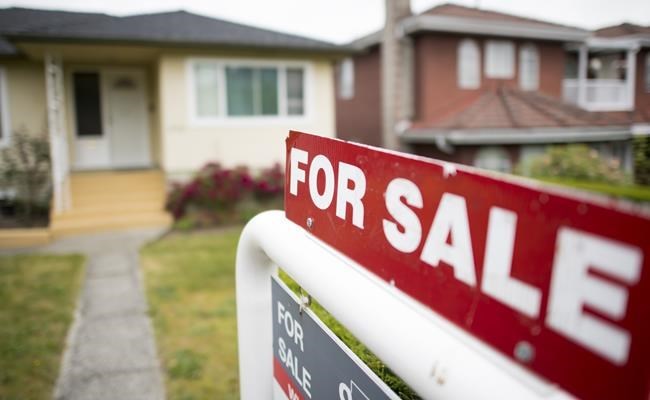
A real estate sign is pictured in Vancouver on June, 12, 2018. Home sales in Metro Vancouver in March plunged to levels not seen in more than three decades and real estate experts blame government policies, not a lack of demand for the dismal showing. THE CANADIAN PRESS Jonathan Hayward
Republished April 02, 2019 - 12:46 PM
Original Publication Date April 02, 2019 - 9:56 AM
VANCOUVER - Home sales in Metro Vancouver in March plunged to levels not seen in more than three decades and real-estate experts blame government policies, not a lack of demand, for the dismal showing.
The Real Estate Board of Greater Vancouver reports 1,727 homes changed hands, a 31.4 per cent tumble from sales recorded for the same month last year.
March 2019 sales were up just over 16 per cent when compared with February, but the real estate board says they were more than 46 per cent below the 10-year average for the month and the lowest total since 1986.
A news release from board president Ashley Smith calls the trend largely induced by policy.
She says governments at all levels have imposed new taxes and borrowing requirements on the housing market for three years.
The board says the result is that housing sales are no longer aligned with the growing economy and low unemployment rates across Greater Vancouver and most of British Columbia.
"What policy-makers are failing to recognize is that demand-side measures don't eliminate demand. They sideline potential home buyers in the short term," Smith says in the release.
She warns that shelter needs are always present and a mortgage stress test, speculation tax and other levies can't relieve that pressure.
"Using public policy to delay local demand in the housing market just feeds disruptive cycles that have been so well documented in our region."
B.C. Finance Minister Carole James says changes both the provincial and federal government have made are starting to show a positive trend.
She says real estate will always contribute to the economy of the province because people want to live in British Columbia.
"But we need some kind of moderation when you have people who can't live in the community that they work in. When you have employers who can't attract workers, that's a crisis. That has an impact on our economy."
She says a speculative real estate market is the worst thing for long term, sustainable economic growth in the province.
Just under 13,000 homes are currently listed for sale in Metro Vancouver, a roughly 52 per cent increase when compared with March 2018, and a 10 per cent jump in one month.
Prices for homes of all types are falling. The board reports the composite benchmark price for all residential properties in Metro Vancouver is currently just over $1 million, down 7.7 per cent over the year and a 0.5 per cent decrease since February.
The benchmark price for a detached home shows the greatest year-over-year slipped to $1.4 million, a decrease of 10.5 per cent since March 2018.
Metro Vancouver condos had a benchmark price of just under $657,000 in March, a six per cent decrease in one year. Condos also recorded the sharpest sales chill, with a 35.3 per cent year-to-year drop.
Townhouse sales were off 27 per cent from March 2018, while the benchmark price was down six per cent over the same period to $783,600.
For all property types, real estate board data shows the sales-to-active listings ratio for March was 13.5 per cent.
Analysts say downward pressure on home prices occurs when the ratio dips below 12 per cent for several months, while home prices often experience upward pressure when it surpasses 20 per cent over the same time frame.
News from © The Canadian Press, 2019